Oktober vorig jaar liepen 4 VS militairen in een hinderlaag waarbij ze omkwamen, dit gaf nogal wat ophef in de VS, waarop het Pentagon aangaf het aantal troepen in Afrika te verminderen...
Niet
eens een jaar later blijkt er van dit voornemen, troepenvermindering
in Afrika, niets terecht te zijn gekomen....... De VS vecht (dat
vechten wordt ontkend, ondanks alle bewijzen daarvoor, zoals de 4
militairen die in Niger werden gedood) in de volgende Afrikaanse
landen Kameroen,
Kenia, Libië, Mali, Mauritanië, Niger, Somalië en Tunesië...
Vreemd ook dat in het rijtje landen Zuid-Soedan ontbreekt, terwijl ook daar VS militairen opereren....... De president van Soedan, Omar al-Bashir, is bepaald geen vriend van de VS en ondanks dat de VS een wapenembargo heeft ingesteld tegen Zuid-Soedan*, werkt de VS, in het 'niet-zo-geheim', samen met het terreurbewind in Zuid-Soedan.......
Vreemd ook dat in het rijtje landen Zuid-Soedan ontbreekt, terwijl ook daar VS militairen opereren....... De president van Soedan, Omar al-Bashir, is bepaald geen vriend van de VS en ondanks dat de VS een wapenembargo heeft ingesteld tegen Zuid-Soedan*, werkt de VS, in het 'niet-zo-geheim', samen met het terreurbewind in Zuid-Soedan.......
Generaal
Thomas Waldhauser, hoofd Africa Command (AFRICOM), zei tijdens een Pentagon
conferentie afgelopen mei, dat ondanks alle moeilijkheden de VS
militairen hun werk geweldig doen over het hele continent Afrika....... (beter had hij gezegd: dat de VS militairen hun werk uiterst gewelddadig doen, immers het gaat om grootschalige terreur in landen waar de VS niets te zoeken heeft, terreur waarmee de VS zelfs terreur kweekt! Tja als je dat erbij zou zeggen kan je moeilijk volhouden dat de VS goed werk verricht in Afrika....)
Lees
het volgende artikel van Nick Turse, zoals eerder geplaatst op
The Intercept:
U.S. SECRET WARS IN AFRICA RAGE ON, DESPITE TALK OF DOWNSIZING
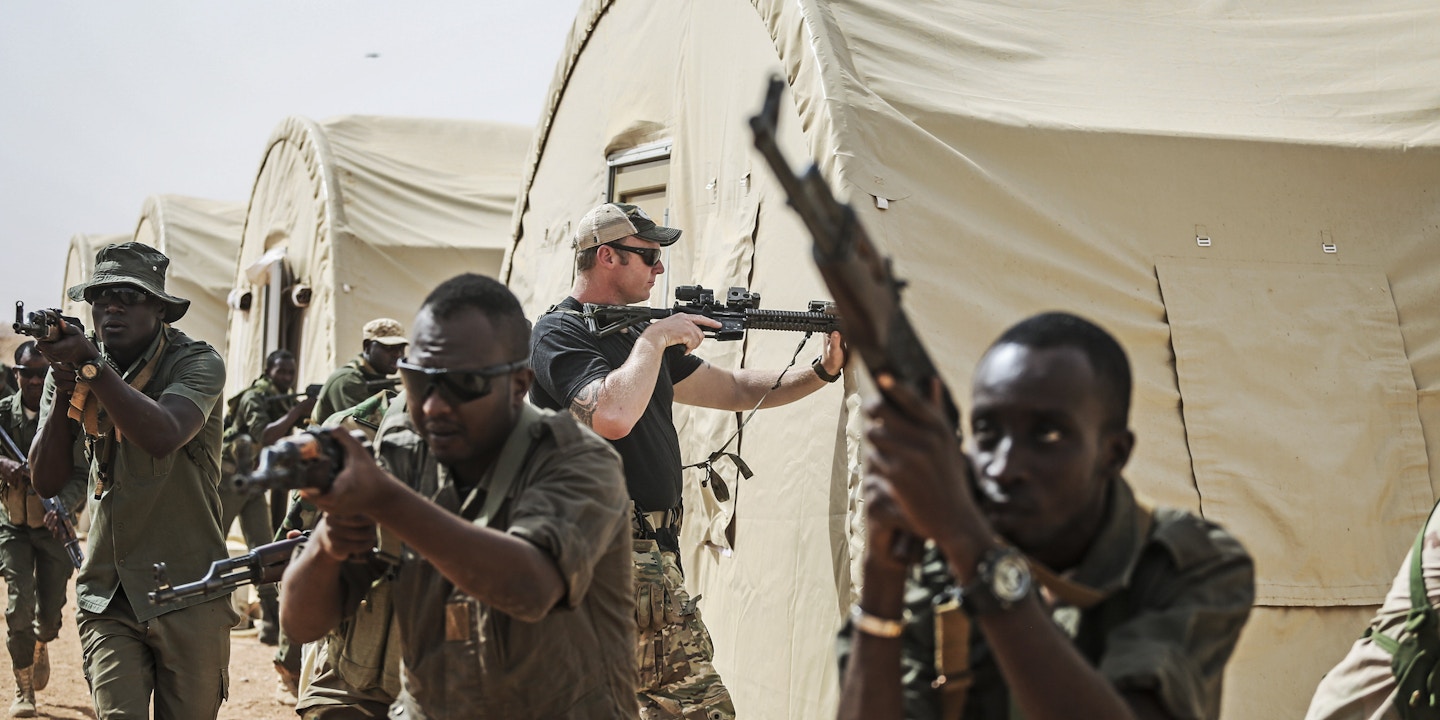
LAST
OCTOBER, FOUR U.S. soldiers – including two
commandos – were killed in an ambush in Niger. Since then, talk of
U.S. special operations in Africa has centered on missions being
curtailed and troop levels cut.
Press
accounts have suggested that the
number of special operators on the front lines has been reduced,
with the head of U.S. Special Operations forces in Africa directing
his troops to take
fewer risks.
At the same time, a “sweeping
Pentagon review”
of special ops missions on the continent may result in drastic cuts
in the number of commandos operating there. U.S. Africa Command has
apparently been asked to consider the impact on counterterrorism
operations of cutting
the number of Green Berets, Navy SEALs, and other commandos by
25 percent over 18 months and 50 percent over three years.
“Anybody
that knows me knows that I would disagree with any downsizing in
Africa,”
While
the review was reportedly ordered this spring and troop reductions
may be coming, there is no evidence yet of massive cuts, gradual
reductions, or any downsizing whatsoever. In fact, the number of
commandos operating on the continent has barely budged since 2017.
Nearly 10 months after the debacle in Niger, the tally of special
operators in Africa remains essentially unchanged.
According
to figures provided to The Intercept by U.S. Special Operations
Command (SOCOM), 16.5 percent of commandos overseas are deployed in Africa.
This is about the same percentage of special operators sent to
the continent in 2017 and represents a major increase over
deployments during the first decade of the post-9/11 war on terror.
In 2006, for example, just
1 percent of all U.S. commandos deployed overseas were in
Africa –
fewer than in the Middle East, the Pacific, Europe, or Latin America.
By 2010, the number had risen only slightly, to 3 percent.
Today,
more U.S. commandos are deployed to Africa than to any other region
of the world except the Middle East. Back in 2006, there were only 70
special operators deployed across Africa.
Just four years ago, there were still just 700 elite troops on the
continent. Given that an average of 8,300 commandos are deployed
overseas in any given week, according to SOCOM spokesperson Ken
McGraw, we can surmise that roughly 1,370 Green Berets, Navy SEALs,
or other elite forces are currently operating in Africa.
The
Pentagon won’t say how many commandos are still deployed in Niger,
but the total number of troops operating there is roughly the same as
in October 2017 when two Green Berets and two fellow soldiers
were killed
by Islamic State militants.
There are 800 Defense Department personnel currently deployed to the
West African nation, according to Maj. Sheryll Klinkel, a Pentagon
spokesperson. “I can’t give a breakdown of SOF there, but it’s
a fraction of the overall force,” she told The Intercept. There are
now also 500
American military personnel –
including Special Operations forces — in Somalia. At the
beginning of last year, AFRICOM told Stars and Stripes, there
were only 100.
“None
of these special operations forces are intended to be engaged
in direct combat operations,”
said Assistant Secretary of Defense for International Security
Affairs Robert S. Karem, while speaking about current troop levels in
Niger during a May Pentagon press briefing on the investigation into
the deadly October ambush. Despite this official policy, despite the
deaths in Niger, and despite the supposed curbs on special operations
in Africa, U.S. commandos there keep finding themselves in situations
that are indistinguishable from combat.
In
December, for example, Green Berets fighting alongside local forces
in Niger reportedly killed
11 ISIS militants in
a firefight. And last month in Somalia, a member of the Special
Operations forces, Staff
Sgt. Alexander Conrad, was killed and
four other Americans were wounded in an attack by members of the
Islamist militant group Shabaab. Conrad’s was the second death of a
U.S. special operator in Somalia in 13 months. Last May, a Navy
SEAL, Senior
Chief Petty Officer Kyle Milliken, was killed,
and two other American troops were wounded while carrying out a
mission there with local forces.
Between
2015 and 2017, there were also at
least 10 previously unreported attacks on
American troops in West Africa, the New York Times revealed in March.
Meanwhile, Politico recently reported that, for at least five years,
Green Berets, Navy SEALs, and other commandos — operating under a
little-understood budgetary authority known as Section 127e that
funds classified programs — have
been involved in reconnaissance and “direct action” combat
raids with
local forces in Cameroon, Kenya, Libya, Mali, Mauritania, Niger,
Somalia, and Tunisia. Indeed, in a 2015 briefing obtained by The
Intercept, Bolduc, then the special ops chief in Africa, noted that
America’s commandos were not only conducting “surrogate” and
“combined” “counter violent extremist operations,” but also
“unilateral” missions.
While
media reports have focused on the possibility of imminent reductions,
the number of commandos deployed in Africa is nonetheless up 96
percent since 2014 and remains fundamentally unchanged since the
deadly 2017 ambush in Niger. And as the June death of Conrad in
Somalia indicates, commandos are still operating in hazardous areas.
Indeed, at the May Pentagon briefing, Gen. Thomas Waldhauser, the
chief of U.S. Africa Command, drew attention to special operators’
“high-risk missions” under “extreme conditions” in Africa.
America’s commandos, he said, “are doing a
fantastic job across the continent.”
Top photo: An American Special Forces soldier trains Nigerien troops during an exercise on the Air Base 201 compound, in Agadez, Niger, on April 14, 2018.
We
depend on the support of readers like you to help keep our nonprofit
newsroom strong and independent. Join Us
*
Volgens de NRC exporteerde de VS al minimaal wapens naar
Zuid-Soedan...... ha! ha! ha! ha! ha! Het is de redactie blijkbaar
nog niet opgevallen dat de VS ook via omwegen een land vol kan
proppen met wapens (zoals de CIA al zo vaak heeft geregeld), desnoods (of zelfs het liefst) aan elkaar
bekampende groeperingen......========================================
De VS heeft meer militaire operaties
in Afrika dan in Midden-Oosten
Hier het tweede artikel van Nick Turse op Vice News, een artikel dat zoals gezegd afgelopen woensdag werd gepubliceerd. Met iets meer actuele informatie. Gezegd moet worden dat Turse bij de aanvang van dit bericht een fout maakt, hij doelt duidelijk op een hinderlaag die in oktober 2017 plaatsvond, terwijl je uit z'n schrijven zou kunnen opmaken dat het om oktober 2018 gaat, in het artikel hierboven wordt ook oktober 2017 aangehaald.
In dit bericht schrijft Turse over het grote aantal militaire operaties die de VS uitvoert in Afrika, operaties die de operaties van de VS in het Midden-Oosten ver overtreffen, al is het aantal VS militairen in het Midden-Oosten veel groter.
Mijn excuus voor de belabberde weergave, krijg het niet op orde.
EXCLUSIVE:
THE U.S. HAS MORE MILITARY OPERATIONS IN AFRICA THAN THE MIDDLE EAST
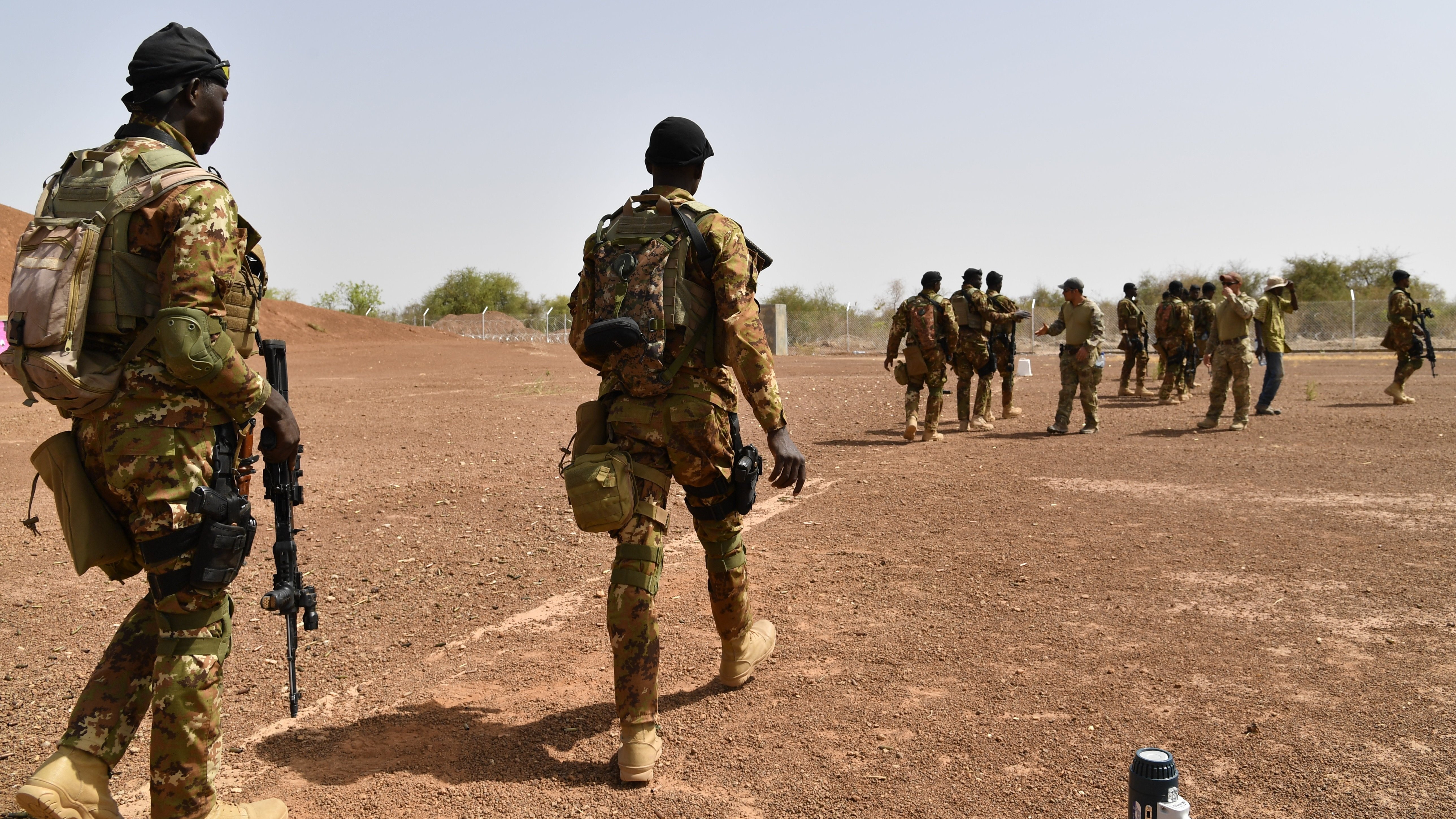
The
deadly ambush in Niger last October that left four U.S. serviceman
dead prompted months of hand-wringing inside the Pentagon. But that
botched operation, which drew national attention to U.S.
counterterror operations throughout Africa should not have shocked
military leadership, the former commander of U.S. Special Operations
forces in Africa told VICE News.
“These
weren’t the first casualties, either. We had them in Somalia and
Kenya,” said retired Brig. Gen. Donald Bolduc, who served as
commander of Special Operations Command Africa (SOCAFRICA) from April
2015 to June
2017,
in an interview with VICE News. “We had them in Tunisia. We had
them in Mali. We had them in Niger, Nigeria, Cameroon, and Chad. But
those were kept as quiet as possible. Nobody talked about it.”
Indeed,
two separate military efforts — named Juniper Shield and Obsidian
Nomad — that were set
to intersect but failed to
on the night of the deadly ambush near Tongo Tongo in Niger were part
of a pattern of expansion on the African continent that has made it
the most active U.S. military theatre in the world. The United States
has conducted more than 30 named operations and activities in Africa
over the last three years, according to documents obtained by VICE
News. While more troops are deployed to, and engaged in combat in,
the Greater Middle East, the sheer number of named efforts in Africa
actually surpasses that region.
VICE
News reviewed documents from the U.S. Army, Africa Command, and
Special Operations Command Africa, and conducted interviews with
current and former military personnel and experts familiar with
America’s “war on terror” in Africa. These documents and
testimony paint a startling picture of a sprawling, labyrinthine, and
at times chaotic shadow war on the African continent, in which
commandos are endangered by a lack of resources and “assistance”
operations blur with combat.
“Africa
has more named operations than any other theater, including CENTCOM
[the command that oversees the Middle East],” Buldoc confirmed to
VICE News. “But remains under-resourced for doing what it’s been
directed to do.”
SECRETIVE AND SPRAWLING
In
2017, U.S. troops carried out an average of nearly 10 missions per
day —3,500
exercises, programs, and engagements for the year —
across the African continent, according to Gen. Thomas Waldhauser,
the AFRICOM commander.
These
efforts — carried out in at least 33
countries —
range from capture-or-kill commando raids to more banal training
missions. Americans are also gathering intelligence, involved in
surveillance and reconnaissance missions carried out by drones,
engaged in construction projects, and accompanying allies on tactical
operations.
There
are also now 34
U.S. military outposts on
the continent, concentrated in the north and west and the Horn of
Africa, according to a recent report by The Intercept.
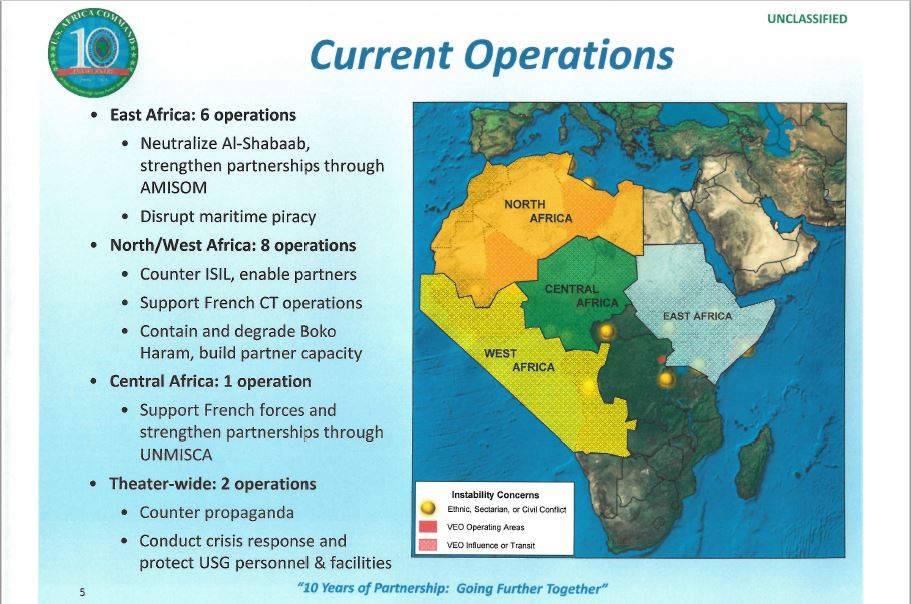
This
March 2018 briefing authored by Africa Command Science Advisor Peter
Teil outlines current U.S. military operations throughout the African
continent. (Nick Turse for VICE News).
Through
the Freedom of Information Act (FOIA), AFRICOM provided VICE News
with a list of 21 named operations conducted between January 1, 2016
and September 25, 2018. According to a separate March 2018 briefing,
authored by Africa Command Science Advisor Peter Teil and also
obtained via FOIA, eight current operations in North and West Africa
were aimed at countering the Islamic State and Boko Haram and
assisting local allies and French counterterrorism efforts. Six
operations in East Africa focused on defeating al Shabaab, assisting
the African Union Mission in Somalia, and counter-piracy. Two
theater-wide efforts focused on crisis response in the event U.S.
government personnel or facilities are threatened, while one
operation — Echo Casemate — provides support to French and U.N.
forces in the troubled Central African Republic.
A
separate Defense Department document, marked “For Official Use
Only,” that appears to have been posted online inadvertently, lists
12 named activities not on AFRICOM’s list, including eight in the
east and another four in the northwest.
Taken
together, these documents represent the most current and complete
record of named U.S. operations and activities recently conducted on
the continent, offering a window into a collection of
little-understood, often overlapping, military efforts unknown to
most Americans.
SPREAD THIN, AND BLURRING LINES
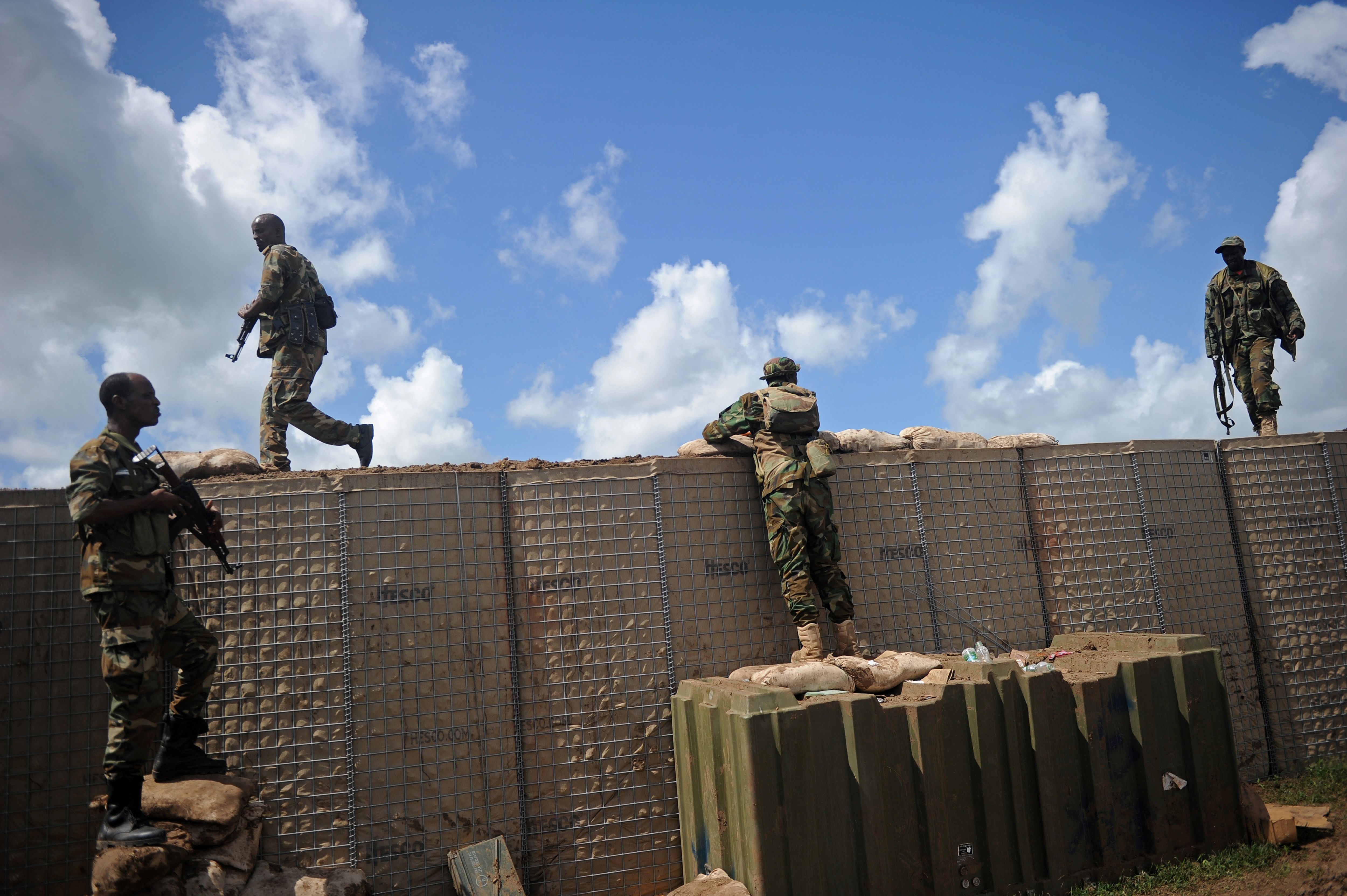
Somali
soldiers are on patrol at Sanguuni military base, where an American
special operations soldier was killed by a mortar attack on June 8,
about 450 km south of Mogadishu, Somalia, on June 13, 2018. - More
than 500 American forces are partnering with African Union Mission to
Somalia (AMISOM) and Somali national security forces in
counterterrorism operations, and have conducted frequent raids and
drone strikes on Al-Shabaab training camps throughout Somalia.
(MOHAMED ABDIWAHAB/AFP/Getty Images).
The
proliferation of so many concurrent counterterrorism efforts courts
danger, said Bill (William) Hartung, the director of the Arms and Security
Project at the Center for International Policy (ASPCIP).
“Running
so many operations with combat implications without making them known
to the American public is both unwise and ultimately undemocratic. It
is no way to run foreign policy in a democracy,” he said. “And
running sensitive operations that are secret, or simply not widely
publicized, increases the risks of failure, because they are not
subject to public debate or adequate scrutiny.”
Bolduc
also criticized the lack of transparency on the part of AFRICOM.
“What we’re doing shouldn’t be a mystery,” he said.
Alice
Hunt Friend, the principal director for African affairs in the Office
of the Under Secretary of Defense for Policy from 2012 to 2014, said
the risks are compounded by the way these operations tend to blur
between “assistance” and combat.
“If
the primary military activity in a country is assistance, then as we
saw in Niger, U.S. combat-related resources are not readily on hand,”
Friend explained.
Among
the operations that provide “assistance” are the classified 127e
programs. These secretive efforts are “aimed at assisting foreign
forces who support U.S. counterterrorism operations,” said Friend.
But
these activities often consist of far more than assistance, said
Bolduc. Classified 127e programs are “direct action” efforts,
which are defined by the Pentagon as “short-duration strikes and
other small-scale offensive actions conducted as a special operation
in hostile, denied, or diplomatically sensitive environments.”
Such
direct-action missions were carried out in Cameroon, Kenya, Libya,
Mali, Niger, Somalia, and Tunisia in recent years, as well as two
nations where the 127e programs have now ended, Ethiopia and
Mauritania, said Bolduc.
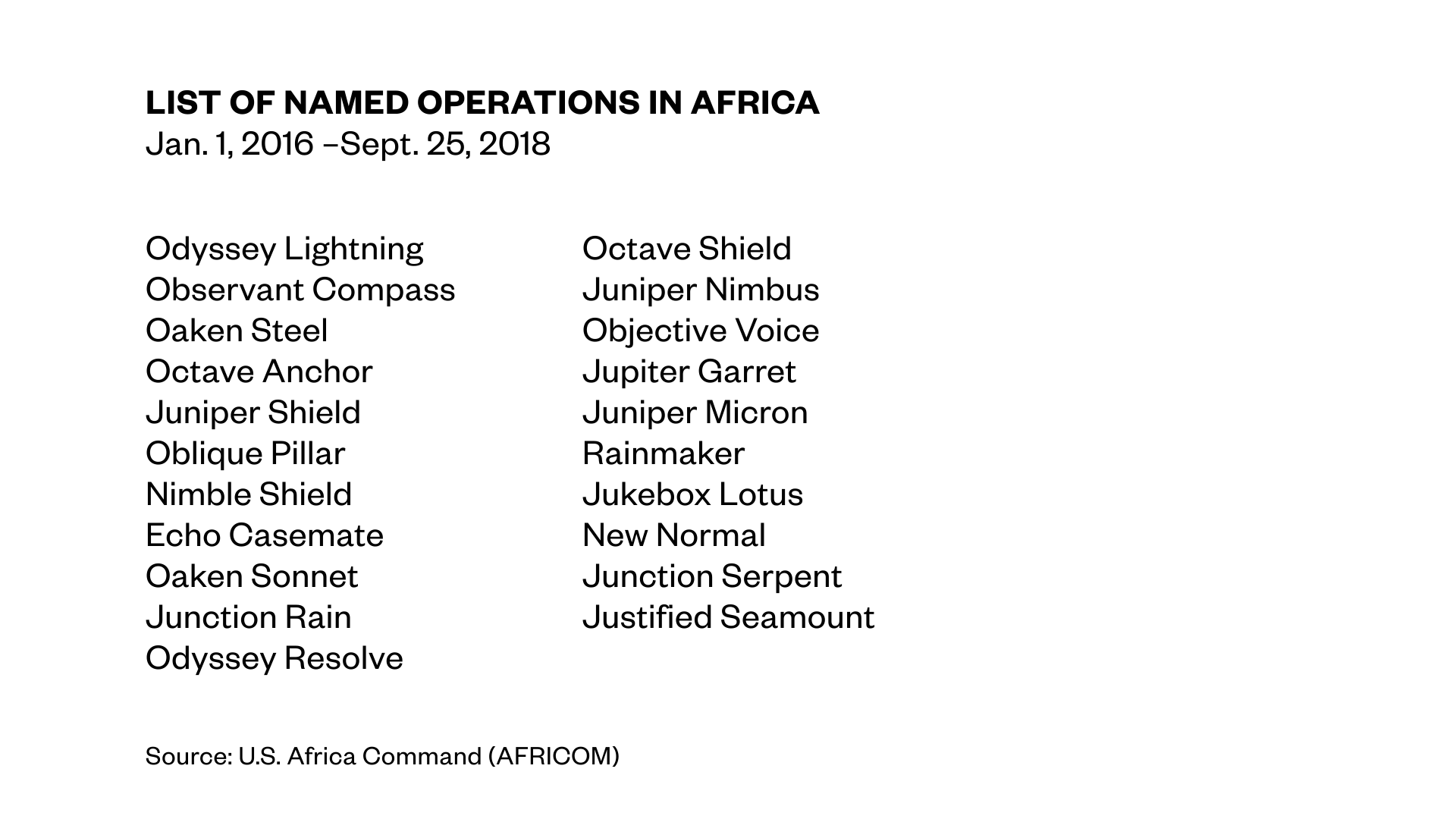
Through
the Freedom of Information Act (FOIA), AFRICOM provided VICE News
with a list of 21 named operations conducted between January 1, 2016
and September 25, 2018. Above is the list. (Nick Turse for VICE
News.)
The
Department of Defense declined to provide details about these
activities because many were “ongoing,” said Navy Commander
Candice Tresch, a Pentagon spokesperson.
“We
are extremely lucky that there have not been more situations like
Niger,” said Hartung. “Running dozens of missions where U.S.
troops are liable to be thrust into combat roles is an extremely
risky approach, putting both their lives and our interests at risk.”
Buldoc
expressed particular concern over what he explained was a persistent
lack of support from the Pentagon. “When I left command, I had 96
missions and 886 tasks associated with those missions in 28 different
countries, in an area that was two and a half times the size of the
United States,” Bolduc said. “I was under-resourced in personnel
recovery. I was under-resourced in ISR [intelligence, surveillance,
and reconnaissance assets]. And I was under resourced in medical
support — the three key things that I needed.”
For
years, the special operations community and its supporters have
expressed concern over deployment
rates, operations
tempo, and the amount of resources being allocated to direct action
missions. “Most SOF units are employed to their sustainable
limit,” General
Raymond Thomas (III), the Special Operations Command chief, told members of Congress last
spring.
In
June, the New York Times reported that Secretary of Defense James
Mattis and Gen. Joseph F. Dunford Jr., the chairman of the Joint
Chiefs of Staff, had grown concerned that commandos across the globe
were spread
too thin.
And the resources afforded to the team ambushed in Niger in 2017, for
example — who relied on contracted medical evacuation services,
French airpower, and lightly armored vehicles — have been
criticized as inadequate and dangerous.
Bolduc,
the former SOCAFRICA commander, laid much of the blame of the Niger
ambush on such deficits and a failure to adequately support local
allies. “That lack of resources — as well as fundamentally
misunderstanding the environment, the situation, and the threat —
meant that we were unable to help our partners solve a regional
problem. Because we didn’t provide an adequate military and
security response, the threat got stronger and more effective. The
direct result was the ambush of our SOF team in October 2017.”
Africa
Command's official investigation, however, concluded that the “direct
cause of the enemy attack in Tongo Tongo is that the enemy achieved
tactical surprise there, and our forces were outnumbered
approximately three to one,” according to AFRICOM’s former chief
of staff, and now the head of the U.S. Army in Africa, Maj. Gen.
Roger Cloutier.
DRAWING DOWN — SORT OF
The
Pentagon told VICE News that the total number of troops assigned to
AFRICOM — about 7,200 personnel — would be cut by less than 10
percent over several years, as it reviews its priority areas on the
continent and reorients itself toward great power rivals.
There
are, by comparison, roughly 24,000
troops deployed
to Afghanistan, Iraq, and Syria, although President Trump recently
suggested that U.S. troops might be withdrawn from
the Middle East due to lower oil prices.
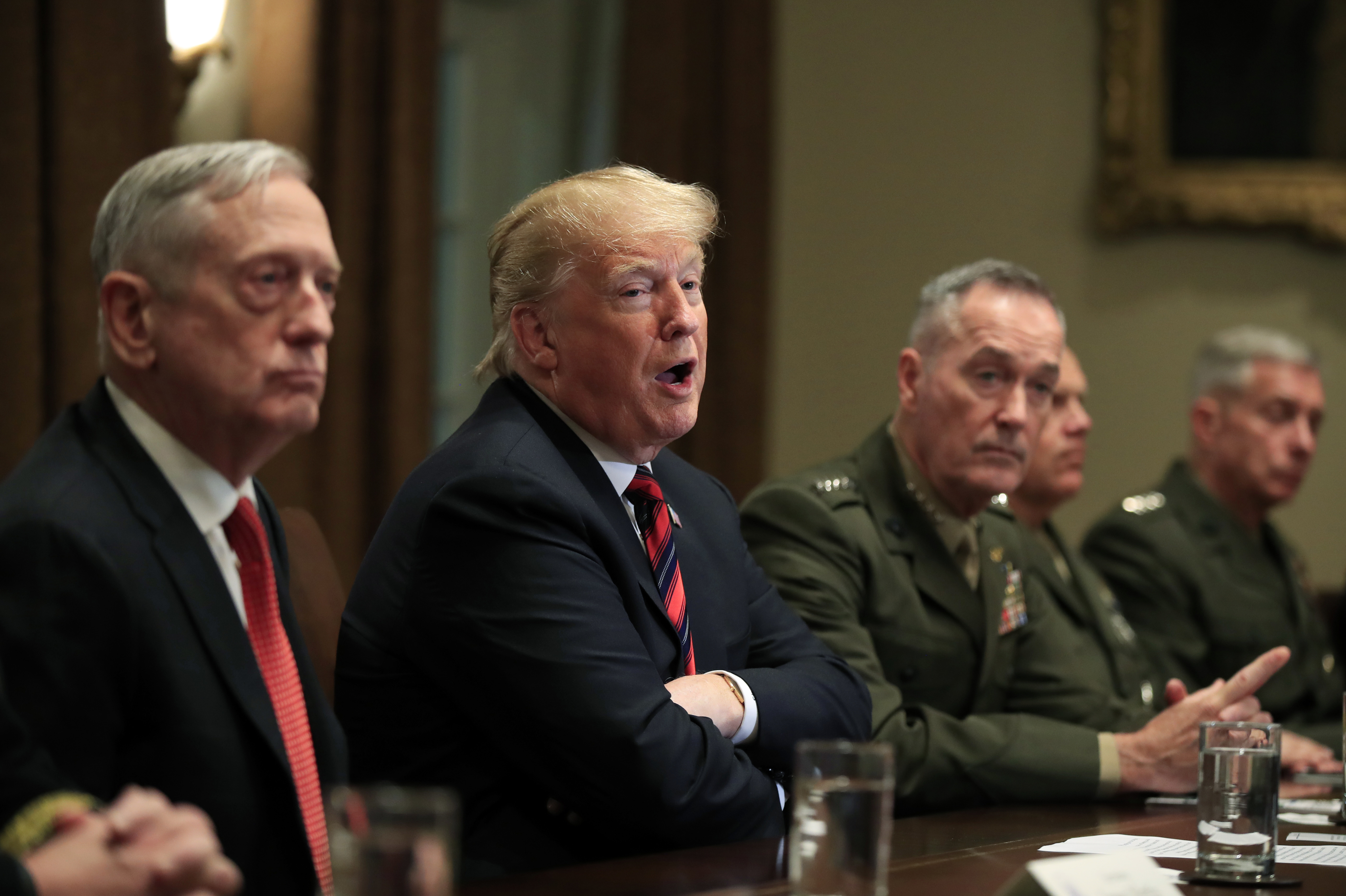
President
Donald Trump with, from left, Defense Secretary Jim Mattis, Trump,
Chairman of the Joint Chiefs of Staff Gen. Joseph Dunford and Marine
Corps Commandant Gen. Robert Neller, speaks during a briefing with
senior military leaders in the Cabinet Room at the White House in
Washington, Tuesday, Oct. 23, 2018. (AP Photo/Manuel Balce Ceneta)
Pentagon
spokesperson Tresch said that the ambush in Niger had nothing to do
with the Defense Department’s decision to modestly decrease troop
levels in Africa. She said the move is predicated on the National
Defense Strategy,
released earlier this year, which calls for increased focus on
near-peer competitors. The Trump administration is reportedly poised
to unveil a broader strategy
for Africa specifically
focused on countering the influence of Russia and China on the
continent.
“As
we prioritize where we need to place concentrations of troops, there
were certain specialties — especially in the Special Operations
arena — that we didn’t necessarily need employed in Africa,”
AFRICOM’s Senior Enlisted Leader Chief Master Sergeant Ramon
Colon-Lopez told
VICE News.
Few,
if any, troops will be cut from hotspots like Libya and Somalia, nor
Djibouti, whose bases also play a pivotal role in U.S. operations in
Yemen and the greater Middle East. Nor will any region of the
continent see all U.S. forces removed. Troop drawdowns in West Africa
will be marked by a shift from tactical-level support to a greater
emphasis on advising, training and intelligence-sharing, the Pentagon
said.
Bolduc,
who supports robust military and diplomatic engagement on the
continent, warned that any significant cuts to special operations
forces would irreparably harm U.S. interests in Africa.
“We’re
becoming risk averse and it’s slowing down the amount of support we
provide to our partner nations in training, advising, assisting, and
accompanying them,” he said. “We’re basically ceding our
strategic leverage and relationship with our African partners to the
Chinese and the Russians.”
But
Friend said there was greater risk in small teams of special
operators conducting far flung and secretive missions on the
continent.
“The
fact that American forces were out in the field like that made them
vulnerable to [ISIS in the Greater Sahara] attacks. If they’re not
forward and not out there, it’s much harder to attack them,” she
said. “So, one of the choices in front of DoD decision-makers is
‘do we want to keep forces forward?’ and therefore ‘what kind
of support do we need to give them?,’” Friend said.
Cover
image: Malian soldiers take part in training at the Kamboinsé
general Bila Zagre military camp near Ouagadougo in Burkina Faso
during a military anti-terrorism exercise with US Army instructors on
April 12, 2018. (ISSOUF SANOGO/AFP/Getty Images)
==================================Zie ook:
'VS vermoordt zoals gewoonlijk straffeloos burgers in geheime Somalische oorlog'
'VS bombardementen: 62 vermoorde stadsbewoners in Somalië'
'De VS heeft 500 militairen ingezet in Somalië, het imperium breidt zich verder uit......'
'VS illegaal militair ingrijpen in Niger, ofwel de uitspattingen van een imperium met expansiedrift'
'VS 'helden' helpen Somalische troepen bij het vermoorden van kinderen, één van de specialiteiten van deze helden..........'
'VS 'helden' helpen Somalische troepen bij het vermoorden van kinderen, één van de specialiteiten van deze helden..........'
'Jeroen Leenaers (CDA): Somalië is 'veilig' voor vluchtelingen.............' en in het verlengde daarvan: 'Jeroen Leenaers (CDA EU): 'veilige landen' moeten asielzoekers terugnemen, anders zwaait er wat........ OEI!!!' en: 'Amnesty International beschuldigt Nederland van het schenden van de mensenrechten, door Somaliërs terug te sturen......'
'VS, in 2016 vermoordde de VS 24.000 mensen, uit landen die op de lijst van inreisverboden staan.......'
'VS pleegt aanslag op een leider van al-Shabaab, geen 'onschuldige slachtoffers.....''


Geen opmerkingen:
Een reactie posten